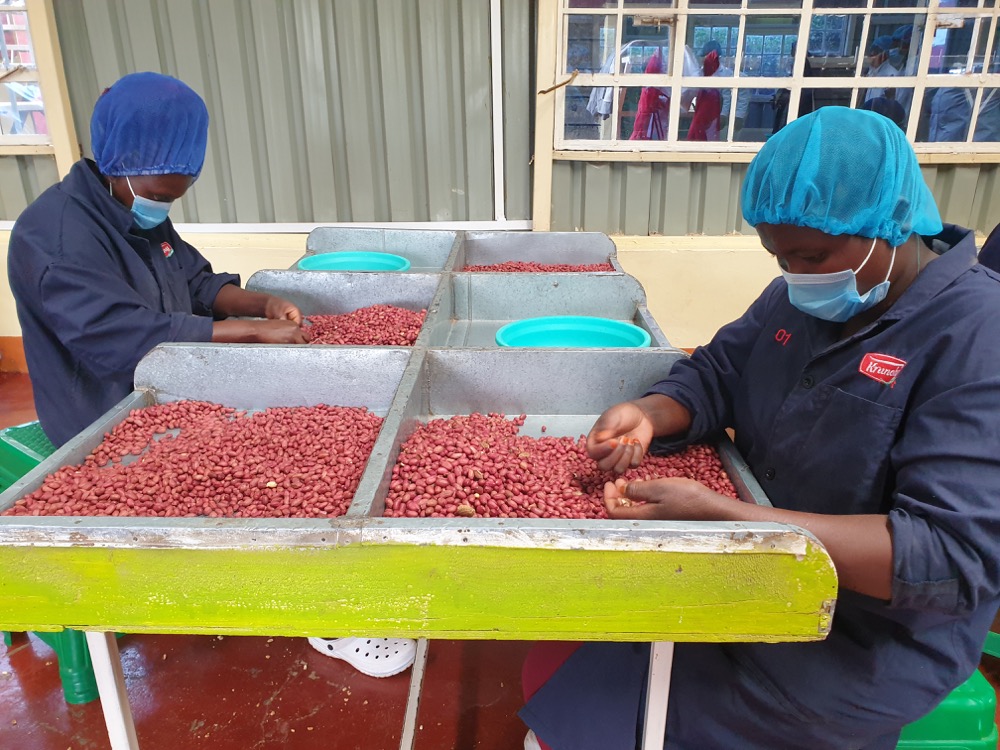Here is a Ready Market for Groundnuts Farmers

With many farmers opting for the traditional maize and beans farming, groundnuts production is yet to gain momentum in the country.
For this reason, Kenya depends on imports, mostly from neighbouring Tanzania and Malawi.
But did you know that there is a ready market for groundnuts within the country?
Besides, consider that while a 90 kilogram bag of maize sells for between Sh2,400-Sh3,000, the, the same amount of groundnuts goes for between Sh13,000 and Sh18,000.
Well, in a bid to find out the readily available market for groundnuts, we visited Bee Care Apiaries International, at Magogoni, along Thika – Ngoliba road.
Here, you are ushered by an aroma of groundnuts, whetting your appetite for this crunchy bite.
The few peels on a corridor is evidence that indeed, there are some groundnuts within what looks like a huge, blue-roofed warehouses.

Processing Peanut Butter
Jackson Masesi, the company’s CEO ushers us into this peanut butter processing plant, which will soon been marking its first anniversary.
Four women are busy separating waste from groundnuts. This is the first procedure, before the groundnuts are put into a roasting machine.
In the roasting machine, the groundnuts are subjected to heating at 200 degrees centigrade, for between 30-45 minutes.
The nuts are then put into a peeling machine, for the removal of the outer cover.
And the peels are not just waste, they are sold to local animal feed manufacturers who use them as raw materials in making feeds.
After peeling, the groundnuts are selected again, to check for any which may have retained their peels, or those which may have internal damages.
Those which pass for processing are then taken to a milling machine, where they are milled to produce a smooth flow of your favourite bread spread; peanut butter.

Adds Some Honey
In a bid to take their product a notch higher, the company adds some honey to enrich one brand of peanut butter, while another brand has crunchy bits to make it exactly that; crunchy.
It was his honey processing venture which inspired him to get into peanut butter production. Masesi explains that he would get more supply of honey than he would sell, and decided to utilize the excess in making peanut butter with honey. Slowly, he adds, he wants to be a key player in bread spread industry.
Although Masesi says he has no problem getting market for the peanut products, the raw groundnuts, which are the raw materials are a challenge, owing to the low number of farmers growing them in the country.
The little he gets locally is mostly sourced from Busia County, Western Kenya.
EU-Funded MARKUP
Interestingly, Busia is among three countries which are set to benefit from a European Union project in promoting competitiveness and market access along the groundnuts value chain.
Dubbed Market Access Upgrade Program (MARKUP) the project will be implemented in a total of 12 counties, but specifically focus on groundnuts in Busia, Siaya and Homabay.
MARKUP is implemented by the United Nations Industrial Development Organisation (UNIDO) in partnership with the government and the private sector.
Besides groundnuts, MARKUP will also promote mango, snow peas, French beans, herbs, spices among other value chains.
Masesi says he hopes to partner with this project and get connected to more farmers who will produce quality groundnuts for processing.
Food Safety and Standards
Wycliffe Nyakundi, the company’s Food Safety and Standards Manager, says farmers must be approved to supply to their company. The approval, he adds, involves taking samples to the laboratory for testing, specifically for aflatoxins and moisture levels.
On receiving the groundnuts at the factory, they are tested for foreign materials, pests infestation, if they are rotten, among other issues, to ensure only the highest quality is processed.
Additionally, Nyakundi adds, the company pays key attention in observing hygiene at the whole process of producing cashew nuts.
According to MARKUP project’s National Coordinator Maina Karuiru, there is need for farmers to focus on quality production, for better produce and higher earning.
The project, Karuiru adds, aims at linking farmers to markets nationally and internationally.
“We want to create markets for Kenyan produce both nationally, in East Africa as well as internationally, especially in the EU,” says Karuiru
For the groundnuts value chain, the project will work with partners to build the capacity of small scale farmers on producing quality, as well as linking them with markets.
Additionally, the project will also promote food safety, especially along the target value chains.
Karuiru recommends that small scale farmers should work in groups, as this way, they will reap from the economies of scale.

I’d like to visit your factory. This is just the business I’ve been thinking of and I’m at an advanced stage of starting but i need a lot of training and advice. I’m based in Embu and due for retirement next year from public service. I hope you won’t mind giving me a few tips on how to go about it.